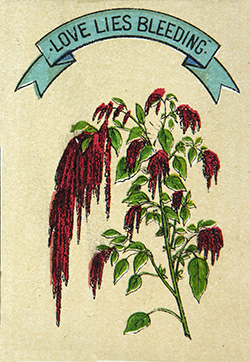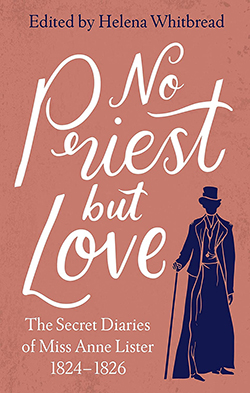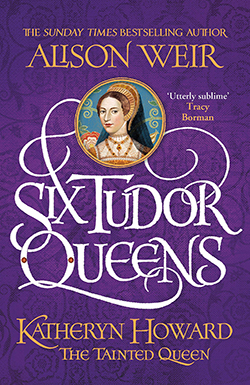The National Archives exhibition With Love is currently closed but if you wish to explore some of the themes raised during a past visit or prepare to enjoy it with deeper understanding when we re-open, there are a wealth of books available to read now.
Love, possibly the most human of emotions, can bring joy and fulfilment. However, forbidden love can be dangerous. Lovers are judged by society and punished for not conforming to its rules. Many of the lovers featured in our exhibition found their love constrained by prevailing social mores. We are fortunate in being able to help tell their stories.

As Naomi Wolf explores in ‘Outrages: Sex, Censorship and the Criminalisation of Love’, sometimes a beautiful love story simply cannot be told or can only be published by twisting pronouns and changing names. Wolf’s book looks at the work of authors including Swinburne, Dante and Christina Rossetti and the lengths they were forced to take to evade the censor. Wolf is a controversial author and one who never lets the truth get in the way of a good soundbite, but her book is eminently readable and makes a very excellent point.
Among the documents in the ‘With Love’ exhibition is Anne Lister’s will leaving a life interest in her estate to her ‘wife’, Ann Walker. Although a closer look at the document shows the bequest was not without strings. Anne was a woman who liked to be in control, living in a society which denied her romantic and sexual freedom of choice.

She is open, funny and courageous. In the 1930s her diaries were found walled up in Shibden Hall and they make fascinating reading. Originally written in code, they have been edited by Helena Whitbread and are available in two volumes: The Secret Diaries of Miss Anne Lister and No Priest But Love.
The diaries cover the earlier period of Anne Lister’s life before her relationship with Ann Walker (almost a relief: two Ann’s is so confusing), but are a candid and intimate record of a life well-lived. Ann is interested in life, whether it is enjoying a veal chop, describing her aunt’s leech treatment or proudly asserting, ‘I love and only love the fairer sex’. She is a voice to listen to.
Another lesbian power couple are Virginia Woolf and Vita Sackville-West. Sarah Gristwood’s book Vita and Virginia is a tribute to two great artists who helped redefine attitudes to love, gender and art – a bi-biograpy if you will. Gristwood’s book is also physically beautiful with a glorious cover and illustrations – do try to get a paper copy if you can.
Although Vita and Virginia are often listed alongside Emma and Nelson, Albert and Victoria and Eloise and Abelard as some of history’s great lovers, their actual affair was passionate but short. Their meeting of minds and friendship, however, lasted until Virginia’s death. The protagonist of Virginia Woolf’s book ‘Orlando’ was reputedly modelled on Vita, and the novel has been described as one of the longest and most charming love letters in history.
For a less individual view of same-sex love through history, turn to Gill Rossini’s Same Sex Love 1700-1957. Written as a research guide for genealogists, it also provides an excellent history of same-sex relationships. For family historians seeking the truth about ancestors whose lives may have been lived partially in secret, this is invaluable.
Even more traditional pairings can be dangerous. Catherine Howard is a woman whose love life caused her downfall. Within the exhibition are documents from her trial, including a letter to her lover Thomas Culpepper. Gareth Russell’s book Young, Damned and Fair brings Catherine vividly to life as a young, flirtatious woman with a taste for unsuitable men; someone full of life but sadly not very bright, in a court where you had to live by your wits and where secrets where impossible to keep. Drawing on letters, Privy Council documents and diplomatic correspondence, Russell builds a picture of Henry VIII’s court and sympathetically tells the story of his tragic fifth wife, countering some common misconceptions.

It is engaging and full of detail but if you prefer to take your history in the form of fiction keep your eye out for Alison Weir’s forthcoming novel, ‘Katheryn Howard: The Tainted Queen’, the next in her ‘Six Tudor Queens’ series and due out later this year. Just go with the spelling by the way Catherine, Katheryn, Katherine – it’s a Tudor thing: they didn’t have spell-checker.
Another royal consort for whom things didn’t end well was Lady Augusta Murray. In Forbidden Wife Julia Abel Smith explores her marriage to Prince Augustus Frederick, sixth son of King George III. Despite marrying him twice (once in Rome and again back in England) the king had their union annulled under the Royal Marriages Act (but not, as you might have thought, because an Augustus marrying an Augusta could only cause confusion, particularly if they were to name their children, you guessed it, Augustus Frederick and Augusta Emma; calling family to the table must have been carnage).
A doomed affair this time from the 12th century was Heloise and Abelard. He was a famous philosopher, she his pupil. They fell in love (or he seduced her: the jury is out and it is difficult to tell from this distance) with disastrous consequences (wincingly so for Peter Abelard). Throughout their lives they wrote to each other and ended up as dear friends and co-religionists. Melvyn Bragg has written a novel, ‘Love Without End’, which twines the story of the medieval couple with that of a contemporary historian researching their lives.
Sadly, The National Archives shop is closed currently, but don’t despair as these books are available in e-book form or from good online book retailers.